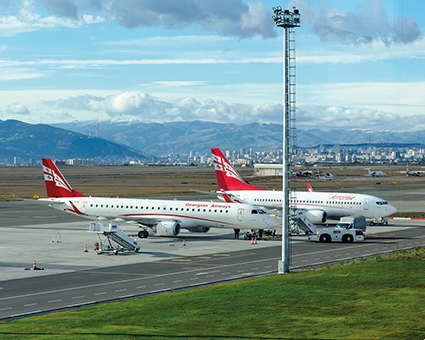Tourism in Georgia Continues to Grow After Flight Ban
Data from the Ministry of Internal Affairs has revealed positive growth in Georgia’s tourism industry, despite the Russian flight embargo which began on July 8.
TBC Bank released an analysis of the data in Caucasus Business Week which shows that although the number of Russians visiting Georgia has fallen, tourism grew by 3.2% year-on-year.
In the first week of July in 2018, 52,144 Russians visited Georgia, compared to 50,030 in the same time period in 2019.
The second week of the flight ban showed numbers dropping from 52,720 Russian visitors in 2018 to 41,423 in 2019, a year-on-year decrease of 21.4%. In addition, Russian airport traffic fell by 78.6% with Batumi and Tbilisi airport losing 88.1% and 75.2% of their Russian customers, respectively.
The number of Russian travelers arriving in Georgia via the Kazbegi land border fell from 26,001 in 2018 to 23,544 in 2019. However, those traveling via alternative forms of land transport rose by 6% from 13,186 to 13,981.
The Ministry of Internal Affairs’ data nonetheless reveals that a significant number of Russians are finding alternative flight routes to fly to Georgia. 2,898 Russians arrived via plane in the second week of July, possibly flying via Armenia or Ukraine.
Although the number of Russian tourists visiting Georgia dropped by 21% in the second week of July this year compared to 2018, the number of visitors to Georgia still showed positive growth of 3.2% year-on-year as the tourism market diversifies.
Russian President Vladimir Putin imposed a ban on direct flights between Russia and Georgia following protests that erupted in Tbilisi on June 20. The protests, often considered to be anti-Russian, began after a Russian MP spoke from the Georgian Parliament Speaker’s chair during a session of the International Assembly on Orthodoxy in Tbilisi.
Protestors called for the resignation of the Parliament Speaker and the Minister of Internal Affairs and the end of Russian occupation in Georgia’s breakaway regions of South Ossetia (Tskhinvali) and Abkhazia.
The flight ban was internationally criticized. Donald Tusk, the head of the European Commission, called the flight embargo “disproportionate, unfair and unjustified.”
The government has launched marketing campaigns targeting both Russia and other countries in an attempt to lessen the effects of the flight ban. In addition, initiatives such as the social campaign #spendyoursummeringeorgia are encouraging tourists from around the world to visit.
Tourism is an important industry for the Georgian economy. Last year, 8.7 million international tourists visited the country, bringing $2.6 billion in revenue in the first three quarters of 2018.
1,404,757 Russian visitors arrived in Georgia in 2018, suggesting that the flight ban could still have a significant impact on the Georgian economy. Georgia’s National Tourism Administration Head Mariam Kvrivishvili said that the industry could lose one million tourists due to the ban.
By Amy Jones
Image source - Emerging Europe












